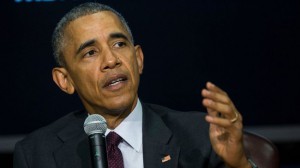Obama Administration Extends Transgender Rights in Public Schools
The Obama administration recently issued a directive to all public schools in the country allowing transgender students to use bathrooms matching their gender identity. The declaration was signed by the Justice and Education department officials and describes what schools can do if any of their transgender students are discriminated against. While it does not carry the force of law, it does impose a threat for any school that does not abide by the law as they may face lawsuits or loss in federal aid. 
President Obama defends his position. “I think that it is part of our obligation as a society to make sure that everybody is treated fairly, and our kids are all loved, and that they’re protected and that their dignity is affirmed.”
The law is the most recent evidence of the Obama administration’s efforts to enact more inclusive civil rights for the lesbian, gay, bisexual and transgender (LGBT) community.
Who are Transgender?
A transgender person is a person whose internal sense of him or herself is different than the gender assigned at birth. It is different than one’s sexual orientation, or who a person is attracted to. In that regard, sexual orientation relates to whether a person is gay, lesbian, heterosexual, or bisexual. Just because a person is transgender does not also mean that he or she is gay or lesbian.
Approximately seven-hundred thousand people identify as transgender in the United States. A recent study showed that a staggering 41% of transgender people in the United States have attempted to commit suicide, compared with 4.6% of the general public.
Criticism
Obama’s directive has met its fair share of criticism. In particular, it brings up issues of federalism. In laymen’s terms, federalism is the process by which two or more governments share powers over the same geographic area. In the U.S., the Constitution grants powers to both the U.S. and state governments. For example, Congress is granted powers to coin money, regulate interstate trade and commerce, declare war, and raise an army and navy. States, on the other hand, are given powers that are not specifically listed under the Constitution, such as requiring drivers’ licenses and collecting property taxes.
The Obama administration has received fierce criticism against the directive. Critics believe the directive goes beyond the bathroom issue and touches on privacy rights, education, records and sex-segregated athletics. The biggest backlash is from ministers, parents and politicians who believe the federal government is imposing its values on individual states, whereas the states have no say in regulating its own rules and laws.
Meanwhile, others argue President Obama cannot withhold federal funding, especially given that Congress has not taken a position on the issue and President Obama will be leaving office by January.
Although critics believe the President has overextended his executive power, the President is given power to issue statewide directives. Additionally, pursuant to the Civil Rights Act of 1964, an administration is permitted to withhold federal funds, but the law isn’t so clear cut. The Act was signed by President Johnson, giving the federal government power to withhold federal funds from segregated public schools.
While President Obama is attempting to withhold federal funds based on public schools’ practices, this situation does not mirror those which were anticipated when the Act was enacted. If he continues to stand firm, it will continue to be met with heated debate and sharp criticism.

Comments